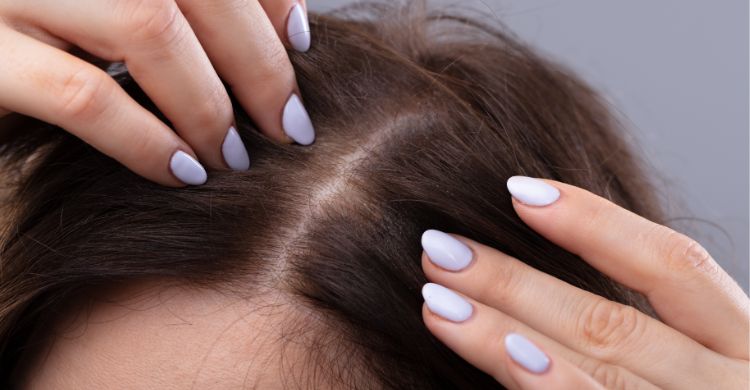What are exosomes for hair growth and how do they help?

Exosomes are small extracellular vesicles that play a role in cell-to-cell communication and are involved in various physiological processes, including hair growth. Exosome therapy for hair growth is a promising area of research and potential treatment for hair loss and thinning,
How do exosomes contribute to maintaining and preventing hair loss?
Exosomes contribute to maintaining and preventing hair loss by promoting hair follicle growth, increasing cell proliferation, enhancing hair follicle health, reducing inflammation, oxidative stress, and promoting cell survival. They deliver growth factors, cytokines, and regulatory molecules that stimulate dermal papilla cells, improve nutrient delivery, and support overall hair health, ultimately leading to improved hair growth and reduced hair loss.
Unlike many hair care products, exosomes operate at a cellular level, ensuring the integrity of the hair growth cycle for longer periods. They not only stimulate the growth of new hair but also improve the thickness of existing strands while reducing baldness and scalp thinning associated with conditions like alopecia. By accelerating cell division, exosomes aid in repairing damaged hair follicles, contributing to the faster growth of new hair.
What is the origin of exosomes?
Exosomes are sourced from salmon testes cells obtained from ethically farmed salmon in Korea, which are then cultivated in embryonic stem cell media. With a remarkable 95% genetic congruency between salmon and humans (polynucleotide), these exosomes are deemed safer than human-derived counterparts and more efficacious than plant-based alternatives. The high purity of DNA found in salmon testes ensures low levels of free radicals and impurities in the exosomes.
Why opt for exosomes hair loss treeatment?
I Exosomes offer a promising hair loss treatment option due to their ability to stimulate hair follicle growth, improve hair health, and reduce inflammation and oxidative stress that contribute to hair loss. They provide a targeted and natural approach to promoting hair growth without the potential side effects or complications associated with other treatments. Utilizing ENTRÆ Technology, the doubling time of harvested exosomes is minimized, resulting in a homogeneous and pure final product with up to 10,000 times more exosomes per unit compared to other sources.
Exosomes for Hair Loss vs. PRP Hair Loss Treatment: Selecting the Right Solution
In the battle against hair loss, both exosomes therapy and platelet-rich plasma (PRP) treatment stand out as popular options. While each method brings distinct advantages, discerning the disparities between the two can aid individuals in making a well-informed decision about which option aligns best with their requirements.
PRP hair loss treatment typically involves monthly sessions for the initial three to four months, followed by maintenance sessions every two to four months. This treatment regimen is designed to enhance hair growth factors and stem cells, which are associated with mitigating hair loss. Research has shown that PRP successfully addresses hair loss in over 70% of cases. The procedure entails extracting platelets from the patient's blood and injecting them into the scalp to stimulate hair follicle activity and facilitate hair growth, leveraging the growth factors within platelets to support tissue repair and regeneration. However, the quality and quantity of PRP can be challenging to control or predict, as it is influenced by factors such as aging, health status, medications, stress, and environmental exposure. Results from PRP treatment may take up to 4 to 6 months to become evident.
On the other hand, exosome hair loss therapy represents a cutting-edge advancement in regenerative medicine. Exosomes not only promote hair growth but also enhance hair quality, demonstrating efficacy in boosting hair density and strength. They are considered the purest form of stem cells, boasting the highest quality and quantity of growth factors available.
While both exosomes and PRP utilize growth factors to stimulate hair growth, their mechanisms target different aspects of the body. Exosomes primarily target existing stem cells in the scalp, while PRP focuses on stimulating tissue repair and regeneration.
Ultimately, the choice between exosomes therapy and PRP treatment hinges on individual preferences, the severity of hair loss, and treatment objectives. Consulting with qualified healthcare providers is essential to determine the most suitable approach tailored to your specific needs. Whether opting for the targeted precision of exosomes therapy or the established efficacy of PRP treatment, individuals can take proactive steps toward rejuvenating fuller, healthier hair.
What to anticipate during exosome hair treatment?
During the application of the exosome solution to the scalp using a micro-needle device or through injections, some individuals may experience mild discomfort or a slight tingling sensation. This sensation is typically minimal and well-tolerated by most people undergoing the treatment. The sensation may be similar to a slight pinching or pricking feeling as the solution is being delivered to the scalp
Following the application of the exosome solution, you may feel a mild warmth or tingling sensation on the scalp as the active ingredients work to stimulate hair follicles and promote cell growth. This sensation is normal and indicates that the treatment is actively working to improve the health and vitality of your hair.
How frequently can I undergo Exosome hair treatments?
The frequency of exosome hair treatments can vary depending on the individual's specific needs and the recommendation of a healthcare provider or hair restoration specialist. In general, exosome therapy for hair loss may be done in multiple sessions with a recommended interval between treatments. Typically, exosome hair treatments are initially done as a series of sessions spaced out over a period of several weeks to months.
This initial series is often followed by maintenance treatments at regular intervals to sustain the results and promote ongoing hair growth. The frequency of exosome hair treatments may vary, but a common schedule could involve an initial series of treatments (3-6 sessions spaced out every 2-4 weeks) followed by maintenance treatments every 3-6 months.
It is important to consult with a healthcare provider or hair restoration specialist to determine the most appropriate treatment plan and frequency based on individual factors such as the severity of hair loss, desired outcomes, and overall hair health. Ultimately, the frequency of exosome hair treatments should be tailored to the individual's needs and goals to achieve the best results in promoting hair growth and reducing hair loss.
Advantages of Exosomes
There are several advantages of using exosomes for hair loss treatment, including:
Targeted delivery: Exosomes can target specific cells and tissues, delivering growth factors and signaling molecules directly to the hair follicles to stimulate growth and improve hair health.
Natural and safe: Exosomes are derived from stem cells or other biological sources, making them a natural and safe treatment option for hair loss with minimal risk of side effects or complications.
Non-invasive procedure: Exosome therapy for hair loss typically involves exosomes liquid being applied topically to the scalp and is finished with microneedling, which is a minimally invasive procedure that does not require surgery or extensive downtime.
Personalized treatment: Exosome therapy can be customized to individual needs and hair loss concerns, providing a tailored approach to addressing hair thinning, hair loss, or other scalp conditions.
Anti-inflammatory effects: Exosomes have anti-inflammatory properties that can help reduce inflammation in the scalp, which is often associated with hair loss conditions such as alopecia.
Antioxidant benefits: Exosomes contain antioxidants that can help protect hair follicles from oxidative stress and free radical damage, promoting healthier hair growth and reducing hair loss.
Long-lasting results: Exosome therapy has the potential to provide long-lasting results for hair growth and maintenance, offering a sustainable solution for managing hair loss and promoting hair regrowth.
Overall, the advantages of using exosomes for hair loss treatment make it an attractive option for individuals seeking a safe, effective, and natural solution to improve hair health and combat hair loss
Dermamina offers bespoke treatments in the vibrant city, London. Specialising in non-surgical cosmetic procedures and skincare treatments for both men and women. Contact Dermamina for a consultation to find out if the treatment is right for you today!
SaveFace
You safety matters

At Dermamina we have successfully attained the Save Face Accreditation, which signifies our consistent adherence to the highest industry standards. To earn this esteemed recognition, we underwent a rigorous evaluation conducted by an independent body.
Read more
Save Face is a register accredited by the Professional Standards Authority, holding official recognition from the Government, the Department of Health, and NHS England. This acknowledgment underscores our unwavering commitment to delivering exceptional quality services, meeting the stringent criteria set by these esteemed organizations.






